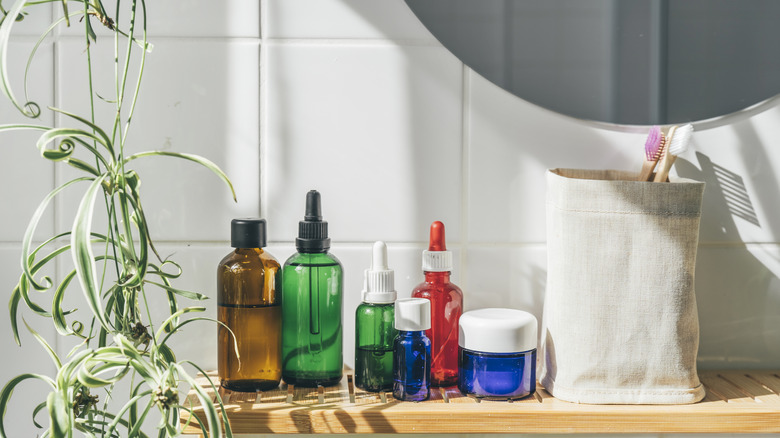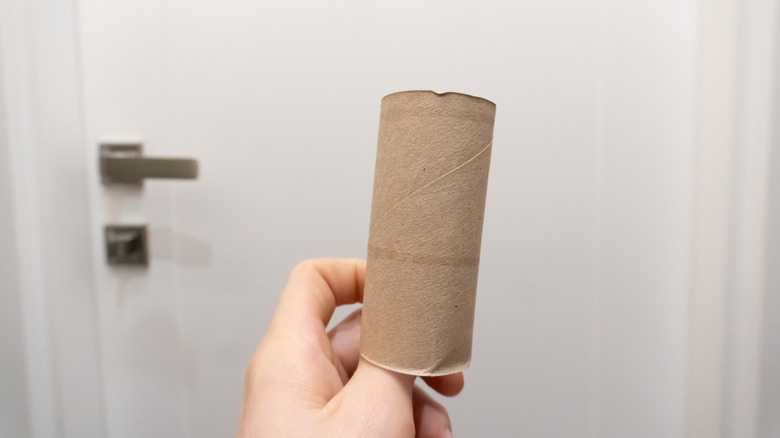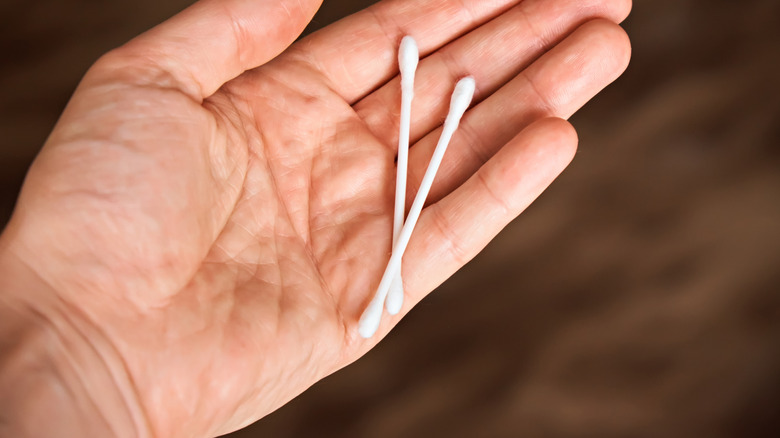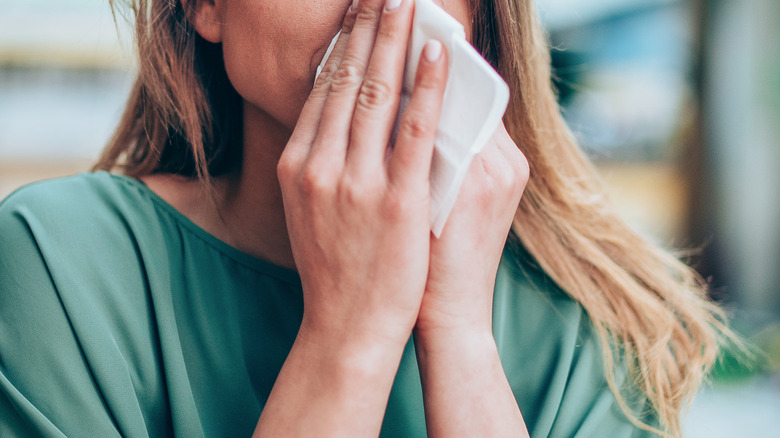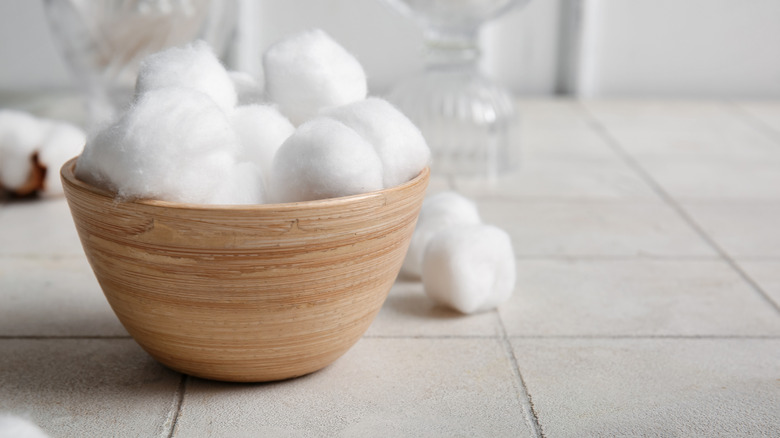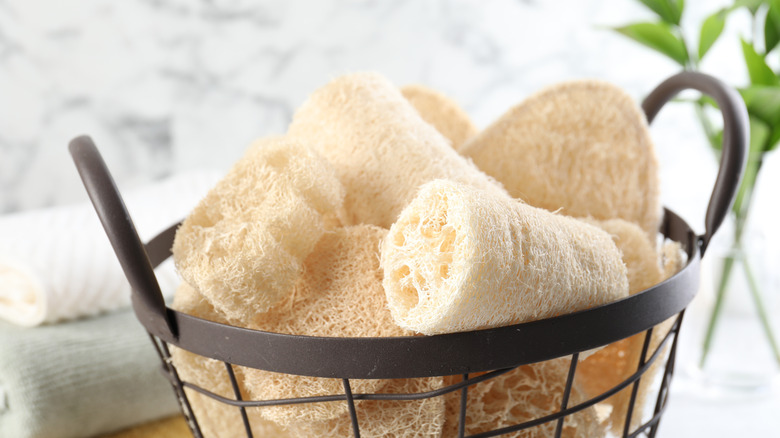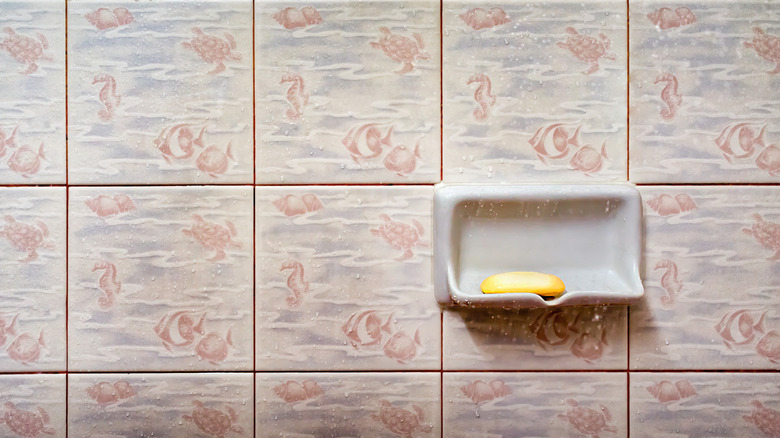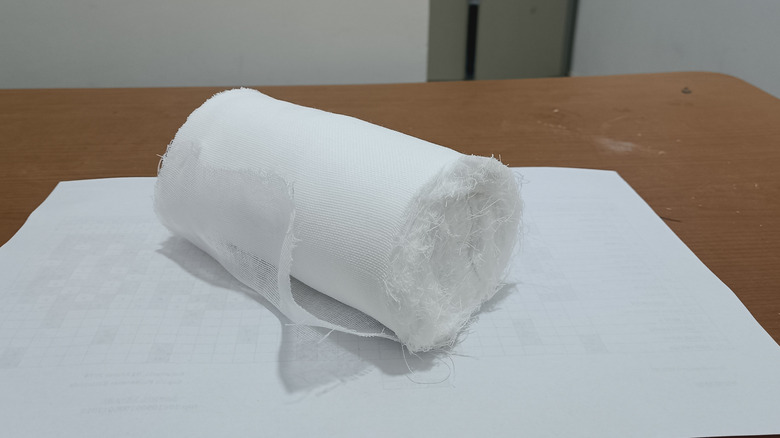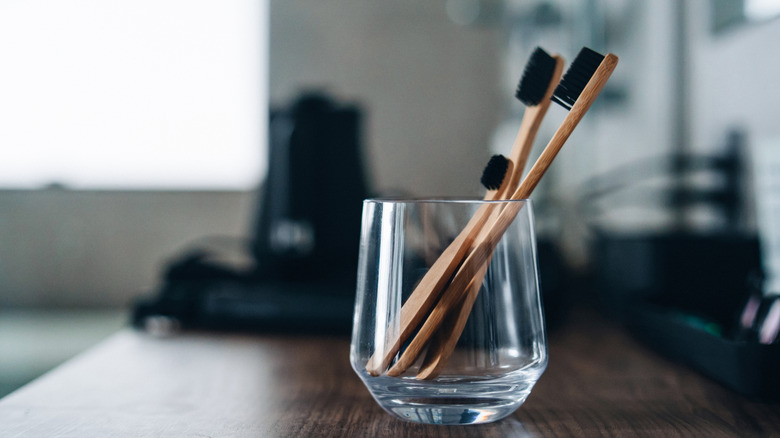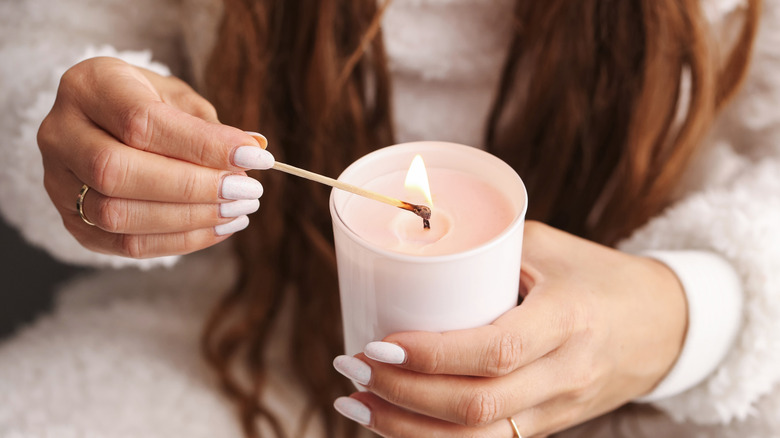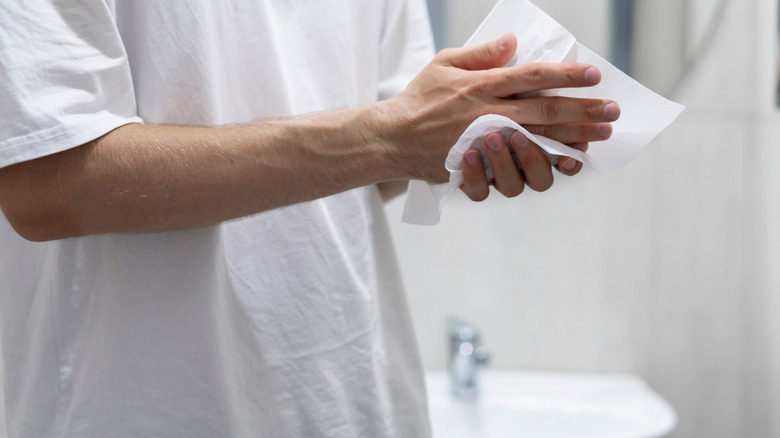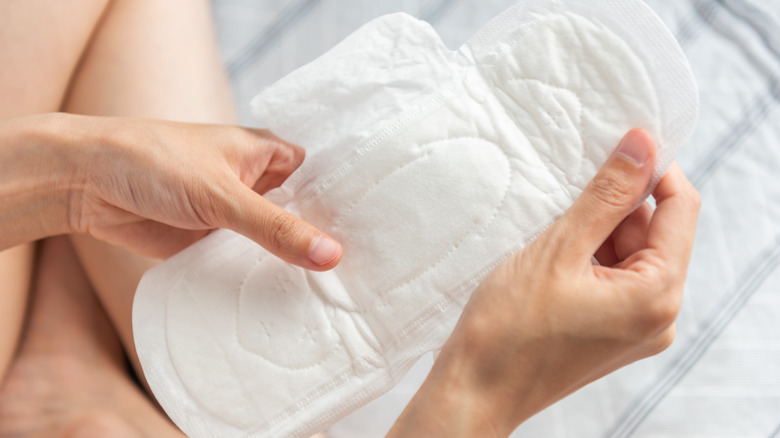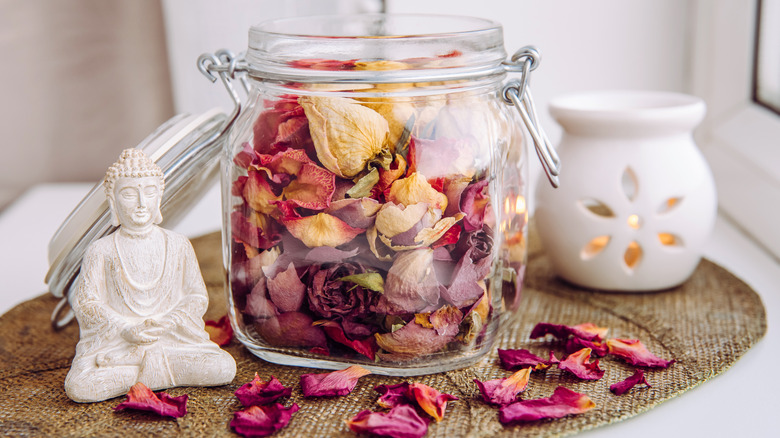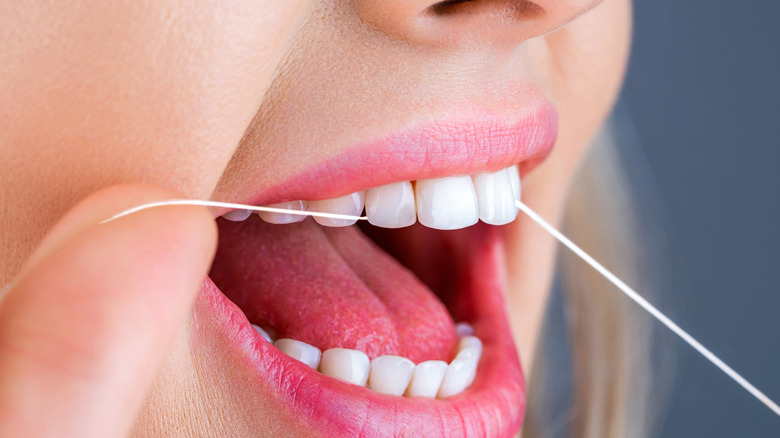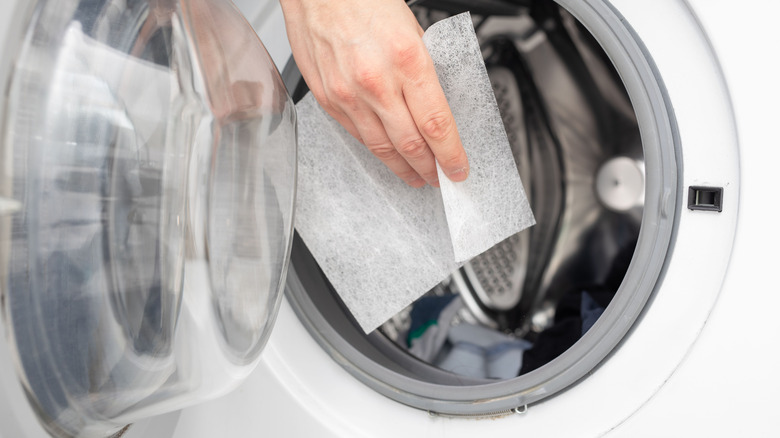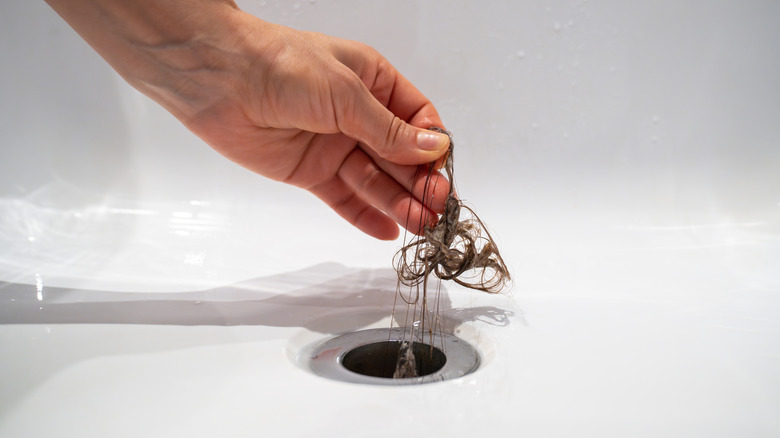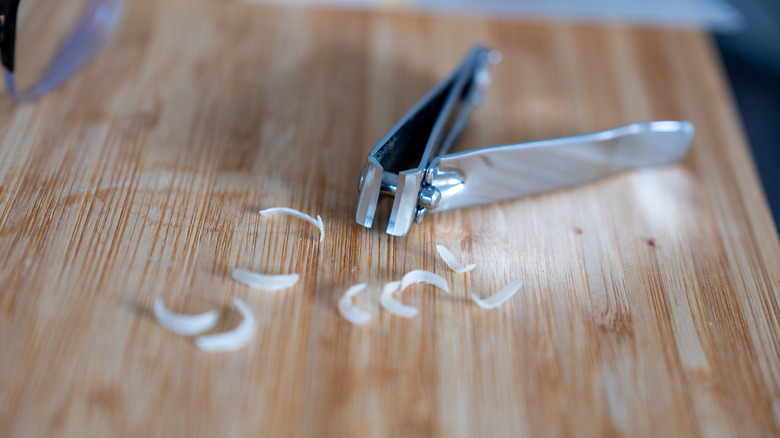17 Unexpected Bathroom Items You Can Put In Your Compost Bin
We may receive a commission on purchases made from links.
When we think about compost bins, our imagination usually stops at kitchen scraps, pulled-out weeds, and coffee grounds. While they indeed make brilliant additions, there are other worthy items you may want to place inside the compost bin after scrounging around your bathroom. Think toilet paper tubes, cotton swabs, loofah sponges, paper towels, bar soap scraps, and menstrual products, to name a few.
Of course, there are caveats attached. Under no instance should you add chemically treated, synthetic, or plastic-lined items into your household compost. In their place, target products made from organic fibers or fully biodegradable fabrics. Also, ensure that they actually add value to the compost pile. For instance, while latex-based condoms can certainly be composted, they don't improve the compost whatsoever. The products mentioned below are mostly browns, that is, high sources of carbon, and must necessarily be mixed with greens (nitrogen-releasing items, such as eggshells, plant materials, and food scraps) to build a garden-worthy compost. Be sure to line the lid with a cut-to-fit activated carbon filter sheet, like Bagean's, to minimize odor and deter flies. Ready to discover unexpected bathroom items that are safe to compost? Here's the list of 17 such items.
Toilet paper tubes
Don't throw out old toilet paper tubes; put them in the compost pile instead. Since they're made from cardboard, they contain a high amount of carbon and function as "brown material" for compost. However, don't just throw them in the bin willy-nilly. Rather, center any anger you might be holding on to and release it by shredding the tubes to bits. This will hasten their decomposition. In case you find such acts distasteful, turn the tubes into a slurry by wetting them, and place them into the bin afterward. This will work even better in worm bins, as these insects greedily devour cardboard.
Cotton swabs
Ignore this one if the cotton swabs are poised on a plastic stem, as plastic has no place in a compost pile and is instead carted off to the landfill. But in case they're attached to a paper stem, feel free to add them to the compost pile after you're done cleaning out the wax or dusting in between a keyboard's keys — but not after using them with a nail astringent. Swabs attached to handles made from cardboard, bamboo, or other natural materials are equally permissible. The same goes for Q-tips because they degrade easily.
Used facial tissues
Paper-based facial tissues, like Kleenex, can also be placed inside a compost bin after use, in some cases. Tissues used to wipe down tears and saliva will gladly decompose in the bin. Similarly, tissues disposed of after cleaning snot during or after a bout of cold also make great composting candidates. Basically, bodily fluids are mostly allowed into compost. However, if you've injured yourself and cleaned off the blood with tissues, trash them instead. Tissues used for removing makeup, skincare, medicines, or strong chemical cleaners should likewise be thrown in the garbage can.
100% cotton balls
As cotton is a natural fiber, it readily breaks down in a compost bin. Given that, if you're certain that the cotton balls you're currently using contain no other material, blend, or adhesives, you can add them to the pile for a boost of carbon (remember "brown" ingredients?). However, if you place them without shredding, 100% cotton balls can take several months to fully decompose. Naturally, cotton balls tossed out after removing makeup or chemical residues are a no-go, as they will make the compost unsafe for gardens.
Loofah sponges
Lest you're confused, we aren't talking about the plastic ball of mesh that's used for exfoliating our skin — technically, that's a bath pouf. Rather, it's about the rough-looking sponges (they're soft once wet), which are derived from the luffa plant (Luffa aegyptiaca). These natural sponges are dried vegetables, and can be utilized to scrub your skin, bathroom sink, or the counter, as you deem fit. Once you're ready to retire them permanently, these biodegradable bathroom items can be safely composted. Another fun fact? You can grow your own luffa — here's how to do it.
Bar soap scraps
The remnant sliver that declares it's time to get a new bar of soap can be composted if it's made naturally — the key is to look for a biodegradable label. Solid bars made from natural materials, such as beeswax, hemp seed, or babassu oil, and which explicitly mention no further additives, including synthetic fragrances, fall under this category. Adding soap to your compost pile (make sure it also contains soil) can minimize the risk of mildew. Even soap nuts, which are berries from the Sapindus tree, can be flung into the green bin at the end of their life.
Natural fiber towels
Bath towels, face cloths, and wash cloths toward the end of their cycle can be chucked into the compost bin. That being said, they shouldn't contain any synthetic fibers, such as nylon or polyester. To keep your compost safe for gardens, stick to towels made from 100% cotton, wool, linen, silk, bamboo, or hemp. Also, slice them down to small bits, or they may take over a year to fully decompose. Cleaning rags used to wipe down the bathroom counters with natural cleaners can also be composted.
Bandages, gauze, and tape
Some of the medical supplies holed up in your bathroom cabinet can be composted, provided they're solely made of natural fibers and don't contain any hypoallergens. Take PATCH body tape, for instance. Since it's made from bamboo, the bacteria in the compost bin can easily break it down. Their paper-lined wrappers or cardboard-based covers can similarly be composted. Cotton gauze and bandages are other excellent contenders. Just make sure to keep plastic, latex, or any other synthetic-based items out of the pile.
Bamboo toothbrush
If you've made the switch to bamboo toothbrushes, such as Nuduko's Biodegradable BPA Free Soft ones, in your zeal to make more eco-friendly choices, you have another reason to rejoice. Once these brushes have been reduced to a sorry state and are due for a replacement, they can be composted — not in their entirety, of course, just the handles. Before lobbing them into the compost bin, remove the wayward bristles using pliers, or if that's inconvenient, break apart the main head and club it with other recyclables. Bamboo handles will decompose completely in six months, though you can accelerate the process by smashing them to bits first.
Matchsticks
Instead of the garbage bin, dispose of used matchsticks in the compost pile. Their wooden handles are a source of carbon, though they can take a considerable time to break down. Additionally, the magnesium and sulfur present in the matchheads may aid plant growth, as these nutrients stimulate chlorophyll production. But if you deem it risky, feel free to snap off the matchhead. Ensure that the matchstick is fully extinguished, as you don't want it to alight the pile. Better yet, consider soaking it in water for an hour before adding it to the compost bin.
Paper towels
Used paper towels can't be effectively recycled since their fibers are minuscule in size. However, they can be popped into the compost pile as a source of "browns." In the bin, they'll release carbon on degradation and help balance out the "greens," ensuring a healthy blend. Naturally, compost only those that aren't chemically dyed or inked, or where you're certain the dyes are vegetable-based — unbleached ones or bamboo-based are ideal. Unless you're diligent about turning the pile, trash the paper towels used to wipe down disinfectants or snot, or they might introduce harmful pathogens to the compost.
Menstrual products
Menstrual products like tampons, pads, and liners surely take the crown for the most unexpected item on this list. But if they're made from biodegradable materials — preferably 100% organic cotton — and are plastic-free, not composting them feels like a missed opportunity. After all, they're a source of brown ingredients. For tampons, avoid those with plastic applicators, though cardboard ones are permissible. Strip away the plastic lining from pads. In hot piles, these products will disintegrate in about six months, though it can extend to 18 months in neglected bins. You can speed up the process by cutting down the products into smaller pieces.
Potpourri
Many homeowners maintain cut garden landscapes and use those flowers as potpourris to perfume their bathrooms (seriously, who wants to shower with that typical bathroom musty smell?). Some even make use of citrus peels for natural potpourris. But once these dried flowers and peels have lost their scent, you can add them to the compost bin, where the bacteria will eagerly break them down. In case of commercial mixes, watch out for any chemical additives, glitter, or artificial scents, as these ingredients will make them unfit for the compost heap and should be emptied in the garbage can.
Compostable dental floss
Admittedly, the matter of composting dental floss remains contentious, with some states insisting it should be trashed, despite claims about biodegradability and plant-based origins. However, according to Dental Lace, which offers silk-based dental floss, its product was successfully composted in a commercial facility in under six months and can be reasonably expected to break down in a home system within a year. Similarly, plant-based vegan flosses made of biodegradable PLA and wax are compostable. Nylon-based dental floss, on the other hand, has no place in your compost bin.
Compostable dryer sheets
Dryer sheets don't only belong to your laundry cabinet; they can surprisingly be used to clear out soap scum or calcium buildup from a shower. If you've taken to keeping a few in your bathroom, check whether they're made of biodegradable materials, such as those on offer from brands like Method and Seventh Generation. If so, you can toss them into the home composting bin or cart them to a municipal facility in case of Method. Under no circumstances should you add conventional, polyester-based dryer sheets, as they're often laced with chemicals and don't degrade in compost.
Hair
Since it's a great source of slow-release nitrogen, human hair is used as an effective soil fertilizer. However, laid bare in all its matted glory in beds, it can appear a tad unseemly to some gardeners. In that case, compost it instead. Hairballs collecting in the drain, clumps marshalled in hair brushes, tresses swirling on the ground after a DIY haircut, or beard trimmings are all fair game. Even the hair shorn off your just-groomed dogs and cats may be utilized — in fact, it'll degrade quicker than human hair. Cut the hair short to avoid lumps. You'll want to skip this one if your hair is dyed or chemically treated.
Nail clippings
Not a bathroom item per se, but the aftermath of using one. Nail clippings, whether off yours or your pet's hands and toes, can also be placed inside the compost bin. Since they're made of keratin, which breaks down to release nitrogen, they're an easy source of green for compost. Like hair, these organic items are fully biodegradable, though they may take a considerable time to do so. To speed up their decomposition, cut down the nails further into shorter pieces. Avoid this unusual compost ingredient if it's coated in nail paint.
